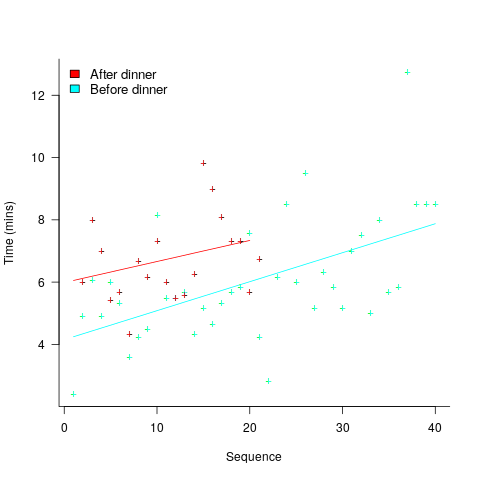Derek Jones from The Shape of Code
Software developers spend a lot of time acquiring knowledge and understanding of the software system they are working on. This mental activity fits within the field of Cognition, which covers all aspects of intellectual functions and processes. Human cognition as it related to software development is covered in chapter 2 of my book Evidence-based software engineering; a reading list.
Cognitive effort (e.g., thinking) is hard work, or at least mental effort feels like hard work. It has become fashionable for those extolling the virtues of some development technique/process to claim that one of its benefits is a reduction in cognitive effort; sometimes the term cognitive load is used, but I suspect this is not a reference to cognitive load theory (which is working memory based).
A study by Arai, with herself as the subject, measured the time taken to mentally multiply two four-digit values (e.g., 2,645 times 5,784). Over 2-weeks, Arai practiced on four days, on each day multiplying over 20 four-digit value pairs. A week later Arai multiplied 40 four-digit value pairs (starting at 1:45pm, finishing at 6:31pm), had dinner between 6:31-7:41 pm, and then, multiplied 20 four-digit value pairs (starting at 7:41, finishing at 10:07). The plot below shows the time taken for each mental multiplication sequence, with fitted regression lines (code+data):

Over the course of the first, 5-hour session, average time taken slowed from four to eight minutes. The slope of the regression fit for the second session is poor, although the fit for the start value (6 minutes) is good.
The average increase in time taken is assumed to be driven by a reduction in mental effort, caused by the mental fatigue experienced during an extended period of continuous mental work.
What do we know about cognitive effort?
TL;DR Many theories and little evidence.
Cognitive psychologists are still at the stage of figuring out what exactly cognitive effort is. For instance, what is going on when we try harder (or decide to give up), and what is being conserved when we conserve our mental resources? The major theories include:
- Cognitive control: Mental processes form a continuum, from those that can be performed automatically with little or no effort, to those requiring concentrated conscious effort. Here, cognitive control is viewed as the force through which cognitive effort is exerted. The idea is that mental effort regulates the engagement of cognitive control in the same way as physical effort regulates the engagement of muscles.
- Metabolic constraints: Mental processes consume energy (glucose is the brain’s primary energy source), and the feeling of mental effort is caused by reduced levels of glucose. The extent to which mental effort is constrained by glucose levels is an ongoing debate.
- Capacity constraints: Working memory has a limited capacity (i.e., the oft quoted 7±2 limit), and tasks that fill this capacity do feel effortful. Cognitive load theory is based around this idea. A capacity limited working memory, as a basis of cognitive effort, suffers from the problem that people become mentally tired in the sense that later tasks feel like they require more effort. A capacity constrained model does not predict this behavior. Neither does a constraints model predict that increasing rewards can result in people exerting more cognitive effort.
How might cognitive effort be measured?
TL;DR It’s all relative or not at all.
To date, experiments have compared relative expenditure of effort between different tasks (some comparing cognitive with physical effort, other purely cognitive). For instance, showing that subjects are willing to perform a task requiring more cognitive effort when the expected reward is higher.
As always with human experiments, people can have very different behavioral characteristics. In particular, people differ in what is known as need for cognition, i.e., their willingness to invest cognitive effort.
While a lot of research has investigated the characteristics of working memory, the only real metric studied has been capacity, e.g., the longest sequence of digits that can be remembered/recalled, or span tasks involving having to remember words while performing simple arithmetic operations.
Experimental research on cognitive effort seems to be picking up, but don’t hold your breadth for reliable answers. Research of human characteristics can start out looking straight forward, but tends to quickly disappear down multiple, inconclusive rabbit holes.
